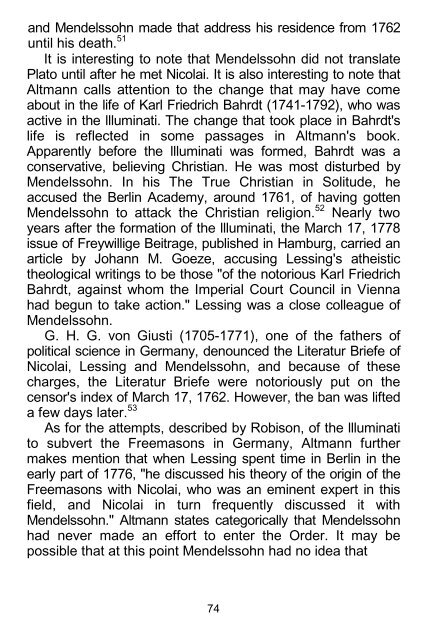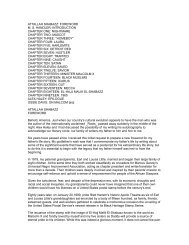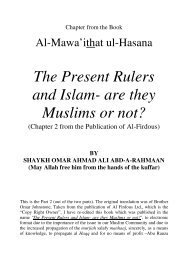Create successful ePaper yourself
Turn your PDF publications into a flip-book with our unique Google optimized e-Paper software.
and Mendelssohn made that address his residence from 1762<br />
until his death. 51<br />
It is interesting <strong>to</strong> note that Mendelssohn did not translate<br />
Pla<strong>to</strong> until after he met Nicolai. It is also interesting <strong>to</strong> note that<br />
Altmann calls attention <strong>to</strong> <strong>the</strong> change that may have come<br />
about in <strong>the</strong> life of Karl Friedrich Bahrdt (1741-1792), who was<br />
active in <strong>the</strong> llluminati. The change that <strong>to</strong>ok place in Bahrdt's<br />
life is reflected in some passages in Altmann's book.<br />
Apparently before <strong>the</strong> llluminati was formed, Bahrdt was a<br />
conservative, believing Christian. He was most disturbed by<br />
Mendelssohn. In his The True Christian in Solitude, he<br />
accused <strong>the</strong> Berlin Academy, around 1761, of having gotten<br />
Mendelssohn <strong>to</strong> attack <strong>the</strong> Christian religion. 52 Nearly two<br />
years after <strong>the</strong> formation of <strong>the</strong> llluminati, <strong>the</strong> March 17, 1778<br />
issue of Freywillige Beitrage, published in Hamburg, carried an<br />
article by Johann M. Goeze, accusing Lessing's a<strong>the</strong>istic<br />
<strong>the</strong>ological writings <strong>to</strong> be those "of <strong>the</strong> no<strong>to</strong>rious Karl Friedrich<br />
Bahrdt, against whom <strong>the</strong> Imperial Court Council in Vienna<br />
had begun <strong>to</strong> take action." Lessing was a close colleague of<br />
Mendelssohn.<br />
G. H. G. von Giusti (1705-1771), one of <strong>the</strong> fa<strong>the</strong>rs of<br />
political science in Germany, denounced <strong>the</strong> Literatur Briefe of<br />
Nicolai, Lessing and Mendelssohn, and because of <strong>the</strong>se<br />
charges, <strong>the</strong> Literatur Briefe were no<strong>to</strong>riously put on <strong>the</strong><br />
censor's index of March 17, 1762. However, <strong>the</strong> ban was lifted<br />
a few days later. 53<br />
As for <strong>the</strong> attempts, described by Robison, of <strong>the</strong> llluminati<br />
<strong>to</strong> subvert <strong>the</strong> Freemasons in Germany, Altmann fur<strong>the</strong>r<br />
makes mention that when Lessing spent time in Berlin in <strong>the</strong><br />
early part of 1776, "he discussed his <strong>the</strong>ory of <strong>the</strong> origin of <strong>the</strong><br />
Freemasons with Nicolai, who was an eminent expert in this<br />
field, and Nicolai in turn frequently discussed it with<br />
Mendelssohn." Altmann states categorically that Mendelssohn<br />
had never made an effort <strong>to</strong> enter <strong>the</strong> Order. It may be<br />
possible that at this point Mendelssohn had no idea that<br />
74




